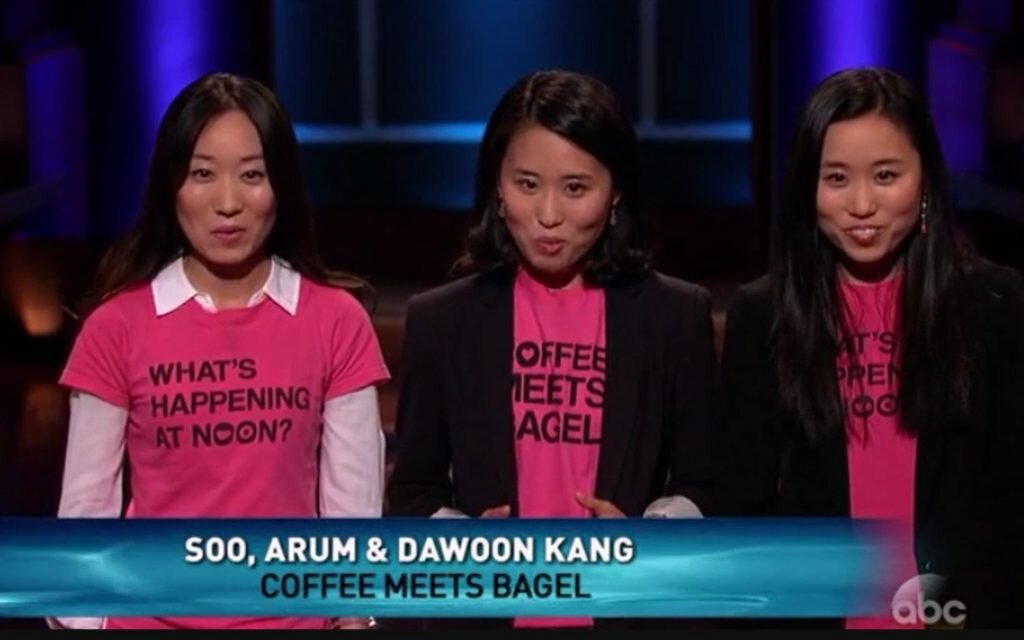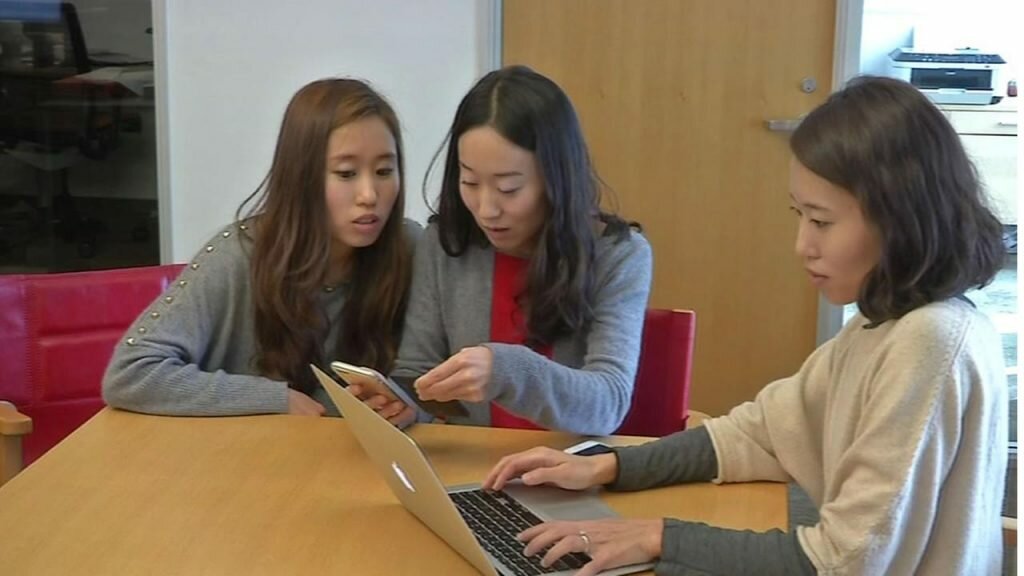The Basics
- Company: Coffee Meets Bagel
- Owner: Arum, Dawoon, and Soo Kang
- Product: Online dating site for women
- Asking Price: $500,000 for 5% equity
- Final Deal: None – Rejected largest offer in Shark Tank history ($30 million from Mark Cuban)
- Season/Episode: Season 6, Episode 13
Coffee Meets Bagel Before Shark Tank
Coffee Meets Bagel is an impressive concept that uses mutual friend matching to take the fear and uncertainty out of online dating. The user-friendly app culls data from Facebook friends and mutual connections to find a high-quality romantic match. If both users approve of the proposed match, the app offers them a coupon or discount to use on dates. First launched in April 2012 in New York City, Coffee Meets Bagel quickly expanded to Boston and San Francisco markets a few months later.
How exactly did this online dating site manage to bag the single largest offer in Shark Tank history (Mark Cuban’s jaw-dropping $30 million proposal)?
And how fast, exactly, did these sister entrepreneurs reject his deal?
Coffee Meets Bagel On Shark Tank: A Quick Recap
Arum, Dawoon, and Soo Kang are three sisters from San Francisco, California. They were born and raised in Korea, but as teenagers they immigrated to America. To say they’re accomplished is a bit of an understatement: one went to Stanford Business School, one went to Harvard Business School, and one went to Parsons School of Design. They put their heads together, quit their high-paying jobs, and went into business together. Their company offers a new twist on online dating, and they believe it has the power to change lives.
They’re here on “Shark Tank” asking for a $500,000 investment in exchange for 5% equity in their company.
They’ve taken the proven concept of daily flash cell sites and merged it with social networking elements to create the highest-quality dating service for singles.
The app works in a beautifully simple way, as Soo explains:
Every day at noon, the app curates one perfect match – a match who also just happens to be a friend of a friend. You have 24 hours to review their profile information and choose to ‘like’ or ‘pass’ on the match. A ‘mutual like’ results in a private chat line that expires in 7 days.
“The secret to online dating success is winning over women,” says Dawoon. “Women are tired of signing up for online dating sites only to get hit on by creepy strangers bombarding them with disgusting messages.” (A fact which this reporter can absolutely confirm.)
The app solves all that, and takes the stigma out of online dating. Since the app was launched, it has grown by double digits each month, and is rapidly becoming a favorite among women.
The core service is free, but premium services can be unlocked using virtual currency in the form of coffee beans. For example, the most popular premium service is called ‘Open Sesame,’ and it reveals to you who the mutual friends are that are usually kept anonymous. This level of intrigue increases the mystery and lures people into buying the Open Sesame feature, which costs about 95 coffee beans (around $0.50 in actual currency).
The app uses a proprietary machine-learning algorithm to sort matches based on user data. All users must sign up through Facebook, and the algorithm uses Facebook’s data as a foundation. No other questionnaires or features are used to gather data at this point, which helps streamline the signup process and keep processing time to a minimum.
“The idea is that you don’t have to make someone go through a separate application process,’ says Kevin.
“Exactly,” the sisters confirm, almost in unison.

Running the Numbers
After an impressive introduction and review of how the product works, the sharks dig into the financial details of the dating app.
- Monthly users: Between 100,000 and 500,000 users
- Annual sales: $87,000 last year; $270,000 in first five months of current year
- Projected annual sales: $1 million for current year; $10 million for next year
- Customer acquisition cost (CAC): $0.30 cents
- Profit margin: negative
The sisters refuse to reveal an exact number of monthly users, which they claim is for competitive reasons, but they are maddeningly vague on this point. They claim that it gives a good idea of user base, but it clearly doesn’t. After repeated grilling from the sharks, Mark Cuban drops out on principle. “I’m out. You have to give us that, are you kidding? I’m out,” he says. The sisters seem unruffled, and continue fielding questions.
As it turns out, their profit margins are negative – meaning they aren’t making any profit currently. They had to spend a huge amount of money upfront, mostly on salaries to pay their web developers. That includes paying themselves a $100,000 salary each. The sharks seem incredulous at this number.
“That is still a significant pay cut from what we were making prior,” says Dawoon, to which Robert responds with rollicking, mocking laughter.
The sisters have raised $2.8 million in external funding so far, with one notable investor being one of the co-founders of Match.com, who loved their idea.
But although they’re raking in the money, they’re not making any.
They plan to break even on a projected $10 million in revenue, but here’s why: they plan to bring on 4 million users next year, which will generate about $2.50 each – hence the $10 million. They plan on spending about $3 million on marketing.
“It is our decision to invest more now to accelerate growth,” says Dawoon, sticking to her guns.

The Bidding
Robert says they’re an all-or-nothing game. They’re losing so much money that they’re not really in the making-money business, they’re merely in the business of acquiring users. They absolutely need to hit a home run for this to work, and it’s too risky for Robert. He’s the first to drop out.
Kevin is next to drop, saying that one of the things he’s noticed after six seasons of Shark Tank is that he’s really, really valuable. And it’s made him very, very greedy. “I don’t do 5% deals,” he says. “That’s worthless to me. I’m out.”
Lori drops next, saying that the combination of the very high salaries they are drawing out of their own business, combined with the internet’s high propensity for knocking off ideas and stealing their business model, makes her weary of investing.
Barbara respects their killer fundraising skills, and says their site is needed. (And she’s right.) The market for this is definitely there, and women really do need a site where they can feel like more than just a piece of meat. Much as she loves the idea, the investment is just way too much risk for way too little payoff. She drops out next, leaving only Mark Cuban remaining.
“Let me ask you a question,” says Cuban. “If I offered you $30 million for the company, would you take it?”
The sisters’ mouths fall open in shock.
They take only a few seconds to regain composure, though, and are swift to answer a resounding “No.”
“30 million dollars might sound like a lot of money, but Match.com makes $800 million a year. We think we’re on track to be as big as Match.com.”
And with that, the Kang sisters walk confidently off stage and out of Mark’s life forever.
Final Deal: None – Largest offer in Shark Tank history, rejected.
Coffee Meets Bagel After Shark Tank
After the Coffee Meets Bagel episode of Shark Tank, the Kang sisters raised $23.2 million over the course of five funding rounds.
The app is still available on both Android and Apple devices and has reportedly 10 million users – but overall, it seems to be struggling. The market dominance the sisters envisioned has failed to materialize. In a search of top-ranked and most-popular dating sites, Coffee Meets Bagel doesn’t even crack the top 20.
Their website, meanwhile, looks sparse and suggests that their marketing angle has shifted from marketing specifically to women, to marketing to young professionals “from the richest countries in the world.” A strange shift, and one that was likely forced upon them with the rise of insanely popular women-oriented dating apps like Bumble and Zoosk.
Given the site’s sink to the bottom of the online dating barrel, it seems like the Kang sisters should have taken Mark’s deal. At least they could have used the money to buy a lifetime supply of bagels.
Disclaimer: The information provided in this article is strictly informational; Seo Insights is not affiliated with Coffee Meets Bagel, SharkTank, or any of its subsidiaries.
